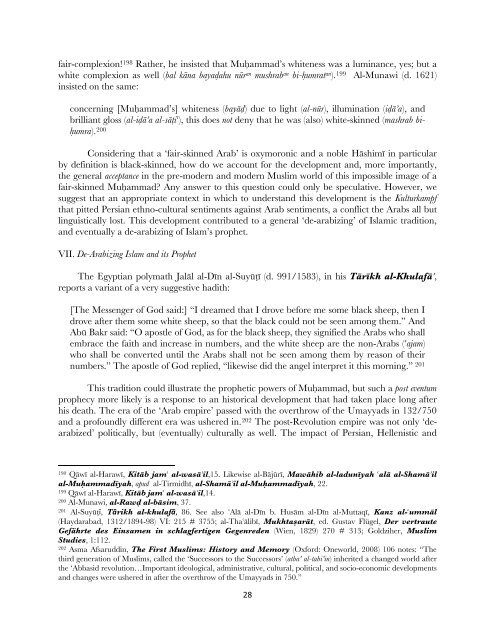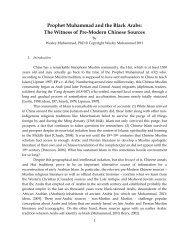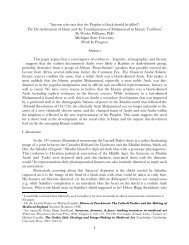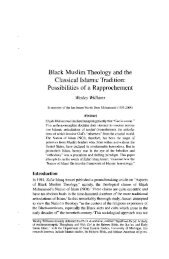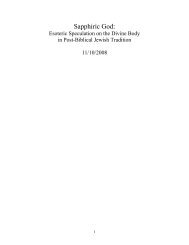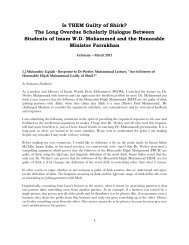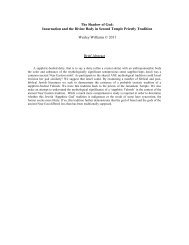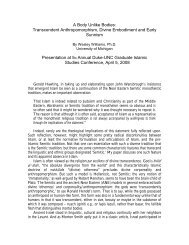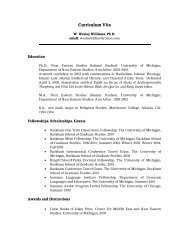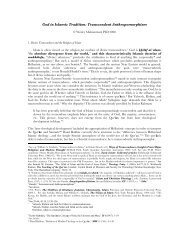“Anyone who says that the Prophet is black should be killed”: The ...
“Anyone who says that the Prophet is black should be killed”: The ...
“Anyone who says that the Prophet is black should be killed”: The ...
You also want an ePaper? Increase the reach of your titles
YUMPU automatically turns print PDFs into web optimized ePapers that Google loves.
fair-complexion! 198 Ra<strong>the</strong>r, he ins<strong>is</strong>ted <strong>that</strong> MuÈammad’s whiteness was a luminance, yes; but a<br />
white complexion as well (bal k§na baya∙ahu nåran mushraban bi-Èumratan ). 199 Al-Munawi (d. 1621)<br />
ins<strong>is</strong>ted on <strong>the</strong> same:<br />
concerning [MuÈammad’s] whiteness (bay§∙) due to light (al-når), illumination (i∙§"a), and<br />
brilliant gloss (al-i∙§"a al-s§ãi#), th<strong>is</strong> does not deny <strong>that</strong> he was (also) white-skinned (mashrab bi-<br />
Èumra). 200<br />
Considering <strong>that</strong> a ‘fair-skinned Arab’ <strong>is</strong> oxymoronic and a noble H§shimÊ in particular<br />
by definition <strong>is</strong> <strong>black</strong>-skinned, how do we account for <strong>the</strong> development and, more importantly,<br />
<strong>the</strong> general acceptance in <strong>the</strong> pre-modern and modern Muslim world of th<strong>is</strong> impossible image of a<br />
fair-skinned MuÈammad? Any answer to th<strong>is</strong> question could only <strong>be</strong> speculative. However, we<br />
suggest <strong>that</strong> an appropriate context in which to understand th<strong>is</strong> development <strong>is</strong> <strong>the</strong> Kulturkampf<br />
<strong>that</strong> pitted Persian ethno-cultural sentiments against Arab sentiments, a conflict <strong>the</strong> Arabs all but<br />
lingu<strong>is</strong>tically lost. Th<strong>is</strong> development contributed to a general ‘de-arabizing’ of Islamic tradition,<br />
and eventually a de-arabizing of Islam’s prophet.<br />
VII. De-Arabizing Islam and its <strong>Prophet</strong><br />
<strong>The</strong> Egyptian polymath Jal§l al-DÊn al-SuyåãÊ (d. 991/1583), in h<strong>is</strong> T§rÊkh al-Khulaf§",<br />
reports a variant of a very suggestive hadith:<br />
[<strong>The</strong> Messenger of God said:] “I dreamed <strong>that</strong> I drove <strong>be</strong>fore me some <strong>black</strong> sheep, <strong>the</strong>n I<br />
drove after <strong>the</strong>m some white sheep, so <strong>that</strong> <strong>the</strong> <strong>black</strong> could not <strong>be</strong> seen among <strong>the</strong>m.” And<br />
Abå Bakr said: “O apostle of God, as for <strong>the</strong> <strong>black</strong> sheep, <strong>the</strong>y signified <strong>the</strong> Arabs <strong>who</strong> shall<br />
embrace <strong>the</strong> faith and increase in num<strong>be</strong>rs, and <strong>the</strong> white sheep are <strong>the</strong> non-Arabs (#ajam)<br />
<strong>who</strong> shall <strong>be</strong> converted until <strong>the</strong> Arabs shall not <strong>be</strong> seen among <strong>the</strong>m by reason of <strong>the</strong>ir<br />
num<strong>be</strong>rs.” <strong>The</strong> apostle of God replied, “likew<strong>is</strong>e did <strong>the</strong> angel interpret it th<strong>is</strong> morning.” 201<br />
Th<strong>is</strong> tradition could illustrate <strong>the</strong> prophetic powers of MuÈammad, but such a post eventum<br />
prophecy more likely <strong>is</strong> a response to an h<strong>is</strong>torical development <strong>that</strong> had taken place long after<br />
h<strong>is</strong> death. <strong>The</strong> era of <strong>the</strong> ‘Arab empire’ passed with <strong>the</strong> overthrow of <strong>the</strong> Umayyads in 132/750<br />
and a profoundly different era was ushered in. 202 <strong>The</strong> post-Revolution empire was not only ‘dearabized’<br />
politically, but (eventually) culturally as well. <strong>The</strong> impact of Persian, Hellen<strong>is</strong>tic and<br />
198 Q§wÊ al-HarawÊ, Kit§b jam# al-was§"il,15. Likew<strong>is</strong>e al-B§jårÊ, Maw§hib al-ladunÊyah #al§ al-Sham§"il<br />
al-MuÈammadÊyah, apud al-TirmidhÊ, al-Sham§"il al-MuÈammadÊyah, 22.<br />
199 Q§wÊ al-HarawÊ, Kit§b jam# al-was§"il,14.<br />
200 Al-Munawi, al-Raw∙ al-b§sim, 37.<br />
201 Al-Suyåãī, Tārikh al-khulafā, 86. See also #Al§ al-DÊn b. Hus§m al-DÊn al-MuttaqÊ, Kanz al-#umm§l<br />
(Haydarabad, 1312/1894-98) VI: 215 # 3755; al-Tha#§libÊ, Mukhtaßar§t, ed. Gustav Flügel, Der vertraute<br />
Gefährte des Einsamen in schlagfertigen Gegenreden (Wien, 1829) 270 # 313; Goldziher, Muslim<br />
Studies, 1:112.<br />
202 Asma Afsaruddin, <strong>The</strong> First Muslims: H<strong>is</strong>tory and Memory (Oxford: Oneworld, 2008) 106 notes: “<strong>The</strong><br />
third generation of Muslims, called <strong>the</strong> ‘Successors to <strong>the</strong> Successors’ (atba’ al-tabi’in) inherited a changed world after<br />
<strong>the</strong> ‘Abbasid revolution…Important ideological, admin<strong>is</strong>trative, cultural, political, and socio-economic developments<br />
and changes were ushered in after <strong>the</strong> overthrow of <strong>the</strong> Umayyads in 750.”<br />
28


